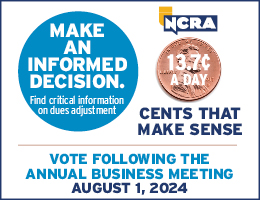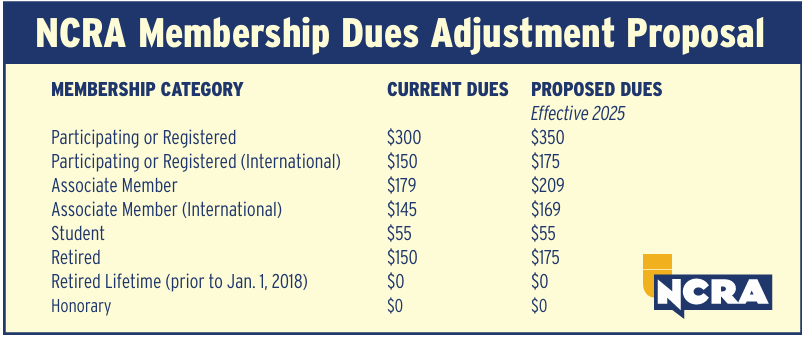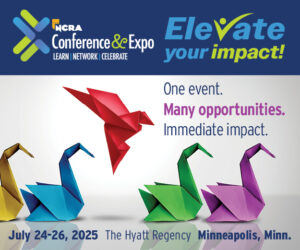The difference between artificial intelligence (AI) and National Court Reporters Association certified court reporters, professional captioners, and legal videographers is simple: Our members capture the spoken word while AI tries to predict it. Our members are consummate professionals who adhere to a strict Code of Ethics while earning certifications that have been established by an Association marking its quasquicentennial this year. In those 125 years, NCRA has kept up with the changing times through effective advocacy, professional development, connecting members to build networks, and facilitating a true sense of community across the country and the world.
An Association reaching its 125th anniversary is no small feat. In fact, it is something that is being celebrated throughout 2024. When NCRA’s founders met at the inaugural National Shorthand Reporters Association convention in Chicago, Ill., they certainly couldn’t fathom that the organization they formed in 1899 would evolve well into the 21st century through two world wars and two pandemics, in peacetime and upheaval alike. What about the next 125 years or even 25 years? How about just the next five years for NCRA?
The members of this storied Association are being urged to enact a $50 dues adjustment to ensure that NCRA can make it through those next five years. If enacted, this will be the first adjustment since 2020. As the rising costs of operating a national association have outpaced the rate of what membership costs, NCRA simply cannot operate on the current dues schedule. In fact, when looking at the industry average, dues adjustments are typically implemented every three years. Since Executive Director Dave Wenhold, CAE, PLC, and John N. Dripps, CPA, CGMA, CAE, Vice President of Finance & Human Resources, joined NCRA in 2019, an aggressive and ongoing effort has been in place to turn over every rock to scrutinize the operating costs for the Association. As a result, Wenhold and Dripps have managed to achieve an annual savings of over $410,000 per year since the last dues adjustment passed in 2019 which went into effect January 1, 2020.
NCRA is not immune to the rising costs of life itself. In fact, the Association has been so effective in its efforts that members have seen the rise of work opportunities, and in turn revenue streams, throughout the country since the previous dues adjustment was enacted in 2020 with a record number of job vacancies making court reporting one of the most lucrative career fields in the United States. The lifeline NCRA has provided to its members is simply undeniable and it has served as a safety net against the ongoing efforts of states and localities to implement deregulation and digital under the guise of misinformation to save taxpayer dollars. NCRA has also served as an advocate for marginalized communities through its ongoing efforts to advocate for closed captioning — something that more than half of today’s consumers of media utilize when watching video, regardless if they are or are not a part of the hard-of-hearing or deaf communities.
As artificial intelligence is being integrated into mainstream American culture, there has been no greater threat to the integrity of the record or to providing equal access for those who need it most. It is during these times of professional uncertainty that court reporters, professional captioners, and legal videographers need to have the power of a national association on their side.
More about the NCRA dues adjustment proposal
How NCRA’s voting process works, important dates for voting members, and more
NCRA voting information is accessible to members only. Please log in to access further content.





